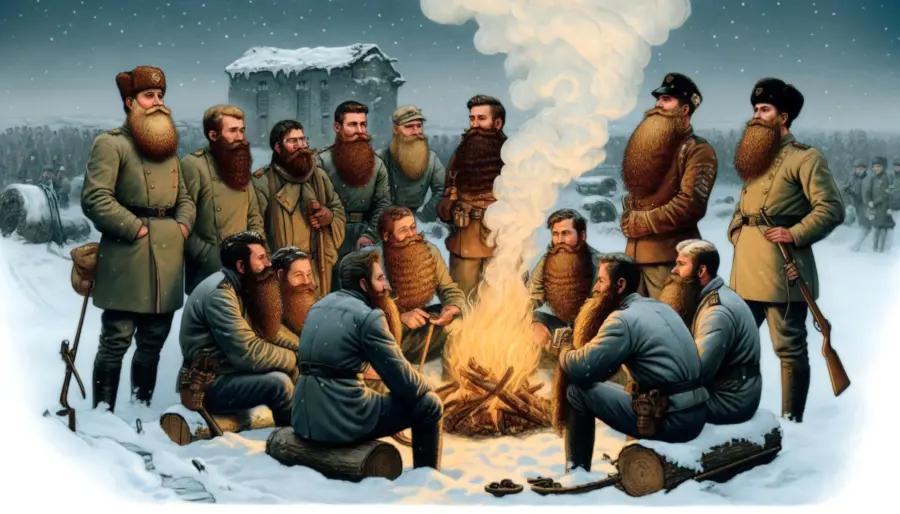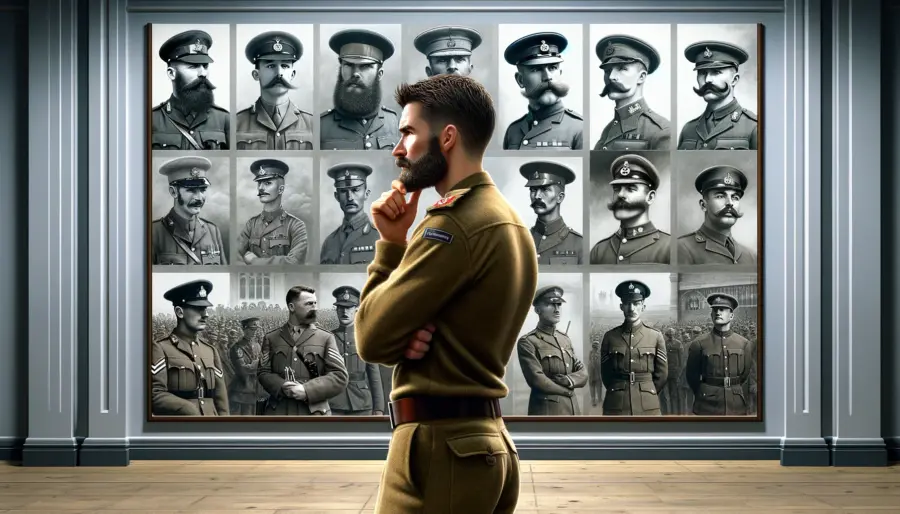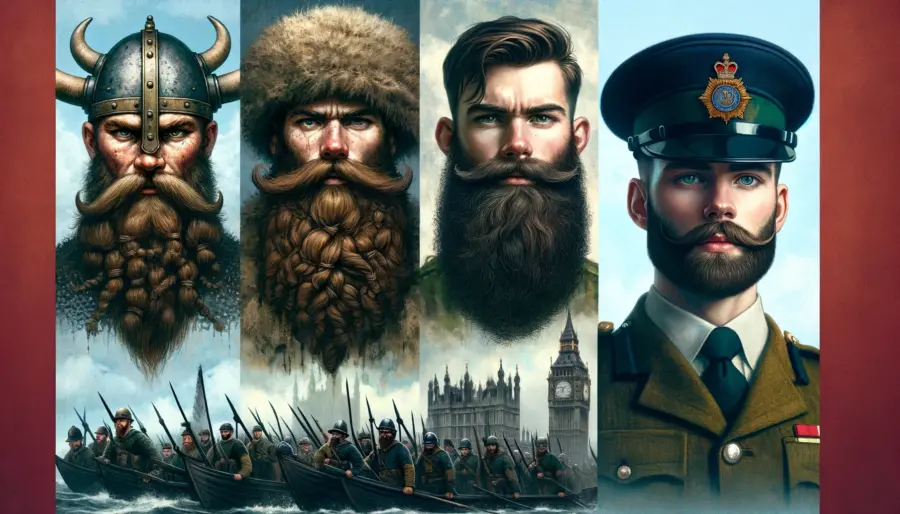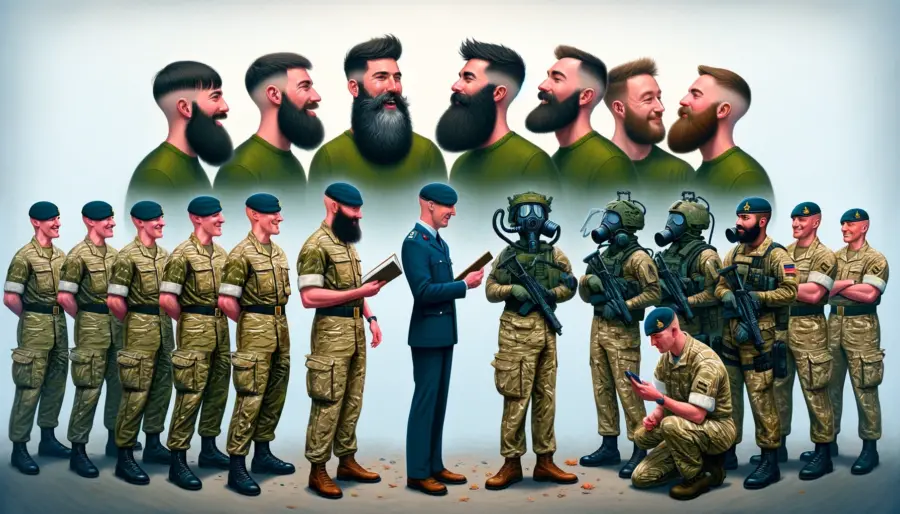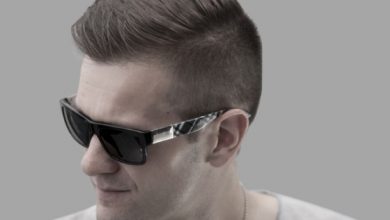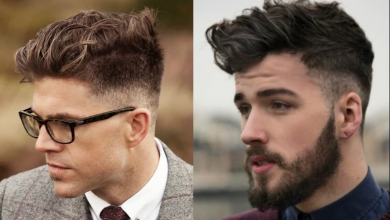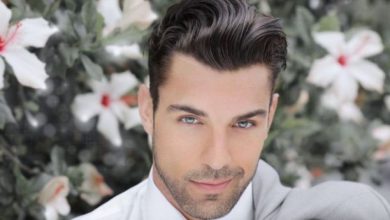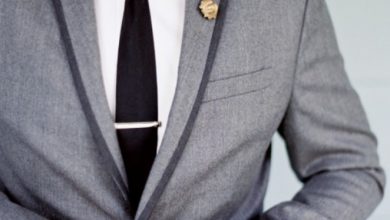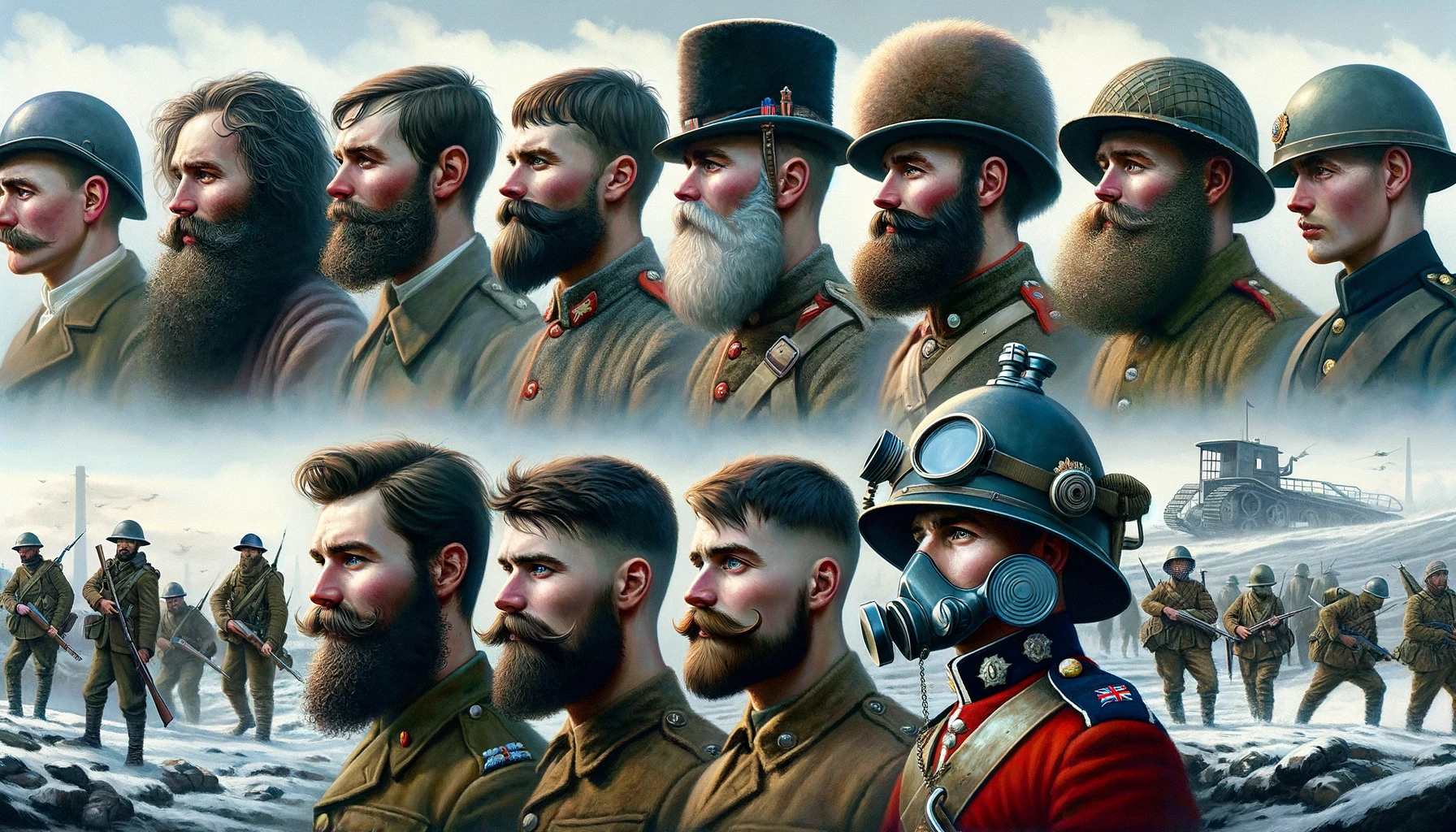
When we picture a classic British soldier, a clean-shaven face usually comes to mind. But the British Army’s relationship with beards is more tangled than you might expect. From banned to bushy and back again, facial hair has seen its fair share of regulations and changing social trends.
Let’s explore why beards sometimes sprouted, the regulations that shaved them off, and the ongoing debate about whether those regulations should change.
The Hairy History of Beards in the British Army
Get ready for a time-traveling adventure through the history of military whiskers!
17th Century: The English Civil War Era
During the English Civil War, beards were generally allowed. Then, changing styles and the need for a tidy appearance led to them being banned for most troops for almost 200 years.
18th Century: The Fall of the Beard
By the 18th century, beards had fallen out of fashion in British society, and the military followed suit. Beards were largely banned, with a one hairy exception: Pioneer Sergeants. Their role as combat engineers meant they often grew beards, making them a distinctive part of army life.
19th Century: The Crimean War and the Victorian Beard Craze
- Crimean War (1850s): Extreme Cold + Limited Supplies = BEARDS! Soldiers fighting in the freezing Russian winter were encouraged to grow beards for warmth. This started a trend that linked beards with tough, battle-hardened soldiers.
- Victorian Era: Beards Become Trendy Facial hair wasn’t limited to the military. Think bushy sideburns and full-on Victorian beards strolling down London streets! Even the Army succumbed, and for a while, moustaches were mandatory. Imagine that!
20th Century: Evolving Beard Regulations
Changing hygiene standards and the need for gas masks in WWI led to beards falling out of favor once more. Moustaches and sideburns still had their moment, but beards?
Only for certain specialists or if approved by the Commanding Officer.
Current British Army Beards Regulations
In the modern British Army, beards are generally prohibited, with a few notable exceptions:
- Medical grounds: Soldiers with certain skin conditions or allergies may be allowed to grow a beard with permission from their commanding officer.
- Religious grounds: Soldiers who belong to faiths that require facial hair, such as Sikhism or Islam, may be permitted to wear a beard.
- Specific roles: Some roles, such as the Pioneer Sergeant, are traditionally allowed to wear a beard as part of their distinctive appearance.
- Special forces: Personnel in special forces units may be allowed to grow beards for operational reasons, such as blending in with local populations during deployments.
Here’s a handy table explaining when a beard might be allowed:
| Reason | Details |
|---|---|
| Medical Conditions | A doctor’s note for conditions like severe shaving rash might clear the way for a beard, but approval from a Commanding Officer (CO) is needed. |
| Religious Reasons | Soldiers may keep beards in accordance with religious tenets, like those of the Sikh faith. Again, permission from the CO is necessary. |
| Pioneer Sergeants | These traditionalists still rock the beard, a legacy of their engineering origins. |
| Special Forces | Sometimes allowed for operational reasons like blending in when deployed overseas. |
Important Note: Even if a beard is allowed, there are strict regulations on length, style, and grooming. It’s not a free-for-all!
Moustaches and sideburns are permitted but subject to specific regulations regarding length and style:
| Facial Hair Type | Regulations |
|---|---|
| Moustaches | – Must not extend below the upper lip or beyond the corners of the mouth – Must be neatly trimmed and not excessively bushy |
| Sideburns | – Must not extend below the middle of the ear – Must be of even width and neatly trimmed |
The Significance and Symbolism of Military Beards
Beards have long been associated with various cultural and symbolic meanings in the military context:
- Warrior Image: Historically, beards were seen as a sign of masculinity, hardiness, and experience – think fierce Vikings!
- Protection from the elements: Beards were believed to provide a degree of protection from cold weather, dust, and other environmental factors.
- Victorian “Beard Magic”: Victorians had a bizarre belief that beards improved health and productivity. Turns out, not so much!
- Modern Symbolism: Today, beards may represent personal expression, a nod to tradition, or even greater acceptance of religious and cultural diversity within the military.
Pros and Cons of Allowing Beards in the British Army
The debate over whether to allow beards in the British Army has various potential benefits and drawbacks:
Potential Benefits
- Improved recruitment: Allowing beards may help attract younger generations who view facial hair as fashionable and expressive.
- Alignment with social norms: Permitting beards would align the Army with changing social attitudes and fashions regarding facial hair.
- Morale and Identity: Allowing beards could be a small but meaningful way to boost a soldier’s sense of individuality within a sometimes rigid system.
- Consistency with other branches: The Royal Navy and RAF already allow beards, so permitting them in the Army would create a more consistent policy across the British military.
Potential Drawbacks
- Professionalism concerns: Some argue that beards can detract from the smart and professional image expected of soldiers.
- Equipment compatibility issues: There are concerns over whether beards may interfere with the proper fit and seal of gas masks and other protective equipment.
- Controversy risk: In an image-conscious world, a bearded soldier caught in a controversial incident could be amplified by the media and cause negative reputation for the unit.
Beard Grooming Tips for British Soldiers
Let’s say the regulations change, and beards become more widely accepted. Soldiers with a newfound love of facial hair will need a new routine! Here’s a quick grooming guide:
- Keep it Neat: No wild man of the woods look! A military beard should be tidy and well-trimmed.
- Don’t Neglect the Rules: If beards are allowed, there will likely be guidelines on length and style. It wouldn’t be very “military” to ignore them!
- Wash Up: Beard hair needs washing just like head hair. A dedicated beard shampoo does wonders.
- Get Conditioning: Beard oil and beard balm help combat dry skin and scraggly beard syndrome.
- Style Guide: If regulations offer some leeway, here are a few beard styles that might work within a military setting:
- Short and Sharp: Trimmed close to the face, neat and professional looking.
- The Garibaldi: A fuller, rounded beard with a defined mustache. Needs regular upkeep.
- The Van Dyke: A short, pointed beard and detached mustache. Takes some skill to maintain.
Pro Tip: Visit a barber specializing in beards for a professional trim and shape, especially in the beginning!
Conclusion
The debate over beards in the British Army isn’t new, and it’s not going away anytime soon. Here’s the thing: it’s not just about hair. It’s a reflection of changing social norms, a military grappling with tradition, and a constant balancing act between projecting a classic image and providing room for individual expression.
Should regulations change? Well, that’s up to those in charge. It’s worth noting that other militaries around the world, including close allies, have embraced more relaxed beard policies without much issue.
For now, British soldiers with a hankering for a beard will mostly have to look on with envy at their Pioneer Sergeant brothers-in-arms. But hey, if you’re medically required or have a religious reason, speak to your Commanding Officer! And if you’re a Special Forces type who loves going undercover… well, your beard might just be your new best friend.
Fun Facts:
- Did you know that in the Victorian era, soldiers were fined for shaving their moustaches without permission? They were considered army property!
- Some historians believe that a clean-shaven face became standard in modern warfare due to the need for a tight seal on gas masks in World War I.
- Other countries’ militaries have varied beard policies: from the Canadian Armed Forces allowing beards with restrictions to stricter regulations in the US Armed Forces.
Frequently Asked Questions (FAQs)
Can you have a beard in the British Army?
Generally, no. However, there are exceptions for medical reasons, religious beliefs (with Commanding Officer approval), Pioneer Sergeants, and sometimes Special Forces.
Why are beards not allowed in the British Army?
Tradition, concerns about hygiene or gas mask effectiveness, and maintaining a clean-cut, professional image are the primary reasons.
Will the British Army ever allow beards?
It’s possible! The debate is ongoing, and other UK military branches already allow them. Changing social norms may gradually influence Army regulations.
What militaries allow beards?
Many! Canadian Armed Forces, the Royal Navy, the Royal Air Force, and several other NATO militaries have beard regulations with varying levels of strictness.
Did soldiers in WW1 have beards?
Early in the war, some did. However, the need for a tight seal on gas masks led to clean-shaven faces becoming the standard.
Are beards unprofessional?
This is subjective. A well-groomed beard can look professional, but some associate beards with an unkempt appearance, which clashes with traditional military ideals.
Do beards make you a better soldier?
No direct link exists. Beards might boost morale for some soldiers, but they don’t improve combat skills.
Do beards interfere with gas masks?
Potentially. Research is mixed, but thick beards may prevent a perfect seal, compromising the mask’s effectiveness.
Were beards mandatory in the past?
Yes! During the Victorian era, moustaches were mandatory in the British Army, thought to signify manliness and authority.
What’s the deal with Pioneer Sergeants and beards?
It’s a historical tradition! Pioneers were combat engineers who often grew beards due to harsh working conditions, becoming a symbol of their unique role.

